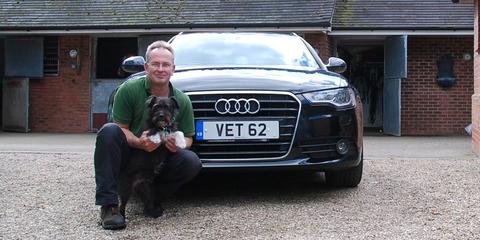Helping Our Canine Friends With Effective Supplements
Modern methods of feeding dogs are believed to be why so many suffer digestive and other issues.
In addition, dogs can be stressed by change and unnatural living conditions including toxins in food, water, and the environment, along with air pollution, just like humans.
It is natural for a dog to eat sporadically, when it would have made a kill in the wild.
When eating wild game, a dog would have enjoyed many parts of an animal, including offal, flesh, bones, and even stomach contents.
In addition, a wild dog would eat eggs from ground-nesting birds, chicks, small creatures, fruit, grass, and berries.
Nowadays, most dogs are fed dried food, "kibble" which is far removed from a natural diet.
We give a daily AminoBooster to our aged Labrador, Sapphire, who acts much younger than her years.
Both AminoBoosters and TeloMind can be given to dogs.
TeloMind is the same formula as AminoBoosters with the addition of Rhodiola rosea, which is an adaptogenic herb. Adaptogenic herbs can soothe anxiety, strengthen the muscles, improve coordination, and help your dog sleep.
Many other dogs and their owners benefit greatly from our supplements.

AminoBoosters™ Young Tissue Extract Supplements
A number of dog owners use AminoBoosters Young Tissue Extract supplements for their dogs and puppies, with remarkable results.
The AminoBoosters Young Tissue Extract supplement has been used by owners since 2014.
The advantages of these cortisol-balancing natural ingredients include being suitable for all types of dogs and their ailments. Reducing high levels of cortisol, the stress hormone, enables the dog's own immune system to get to work instead of being suppressed.
Dogs can respond very well to the balancing of cortisol levels, along with demonstrating increased calm and good behaviour.
The muscle-conditioning and stem cell generative abilities of AminoBoosters are added bonuses.
As a precaution, do not use in pets with bleeding disorders, within one week of surgery, or when blood-thinning agents are being used, because of the herb Ginkgo biloba in the AminoBoosters and TeloMind formulas. Ginkgo biloba should not be combined with high doses of fatty acids due to the potential for bleeding disorders.
Frequently asked questions regarding the use of Health Evolution products with animals:

1.0 Has the Young Tissue Extract been used in veterinary supplements?
Not officially although it is used by vets and pet owners with success.
2.0 What is the dosage per kg or lb body weight for Young Tissue Extract?
23 mg per 1 kg or 2.2 lbs
Each capsule contains 400 mg of Young Tissue Extract - suited for a 17 kg or 38 lb dog.
So, for example, a 35 kg or 77 lb dog could have up to 2 capsules per day, a 100-140lbs dog could have up to 3 capsules per day.
Very often, one capsule is sufficient to maintain good health.
For smaller dogs, you can pull apart the capsule by gently twisting in opposite directions, and just use part of the contents per day.
3.0 Is there any taste or odour? Would it need to be masked for acceptance by animals?
Minimal taste (“biscuity”), no odour, does not need to be masked
4.0 Is it water soluble?
No although it can be stirred into water/gravy. Do not use hot water because this can destroy the live active nutrients.
5.0 Is Young Tissue Extract in powder or granule form?
Powder
6.0 Can Young Tissue Extract be used in young animals to boost growth & development? Is there any age limit on when it could be started?
Yes Young Tissue Extract can give given to young animals. There are no known contraindications
7.0 Can Young Tissue Extract be used in animals with compromised kidneys/ liver disorders/ post-surgery/ cardiac conditions?
There are no known contraindications so long as there is no bleeding; do not use within one week of surgery.
8.0 What is the shelf life of the Young Tissue Extract ingredient & the finished products?
Usually up to five years for Young Tissue Extract.
Usually 3 years for finished products depending on formula ingredients
9.0 Are there any contraindications"
As a precaution, do not use in pets with bleeding disorders, within one week of surgery, or when blood-thinning agents are being used, because of the herb Ginkgo biloba in the AminoBoosters and TeloMind formulas.
10.0 Does the product need any special storage? Does it need to be refrigerated?
The product needs to be kept dry and cool at room temperature
UK Vet Uses And Recommends AminoBoosters
Roger Meacock BVSc MRCVS, is a qualified UK Veterinary Surgeon, with an International Referral and Second Opinion practice.
Roger recommends AminoBoosters for use with dogs, cats, horses, and other animals.
Roger treats dogs including Crufts champions and qualifiers.

Roger and his clients have had considerable health successes, in many cases where "proven" approaches have failed.
Roger says,
"There are a number of genuine reasons why some of the techniques and products I use have not been subjected to the sort of trials often mistaken as evidence for being effective and "proven". Similarly, many "proven" commonly used techniques and products do not have this level of proof either! In many cases, the "science" behind these "proven" techniques and products is poor, unrepeatable and unreliable..."
This view is reinforced by Dr Richard Horton, editor of The Lancet, who wrote in The Lancet and as Guest Editor for the Medical Journal of Australia (MJA 2000; 172:148-149)
"The mistake, of course, is to have thought that peer review was any more than a crude means of discovering the acceptability — not the validity — of a new finding. Editors and scientists alike insist on the pivotal importance of peer review.
We portray peer review to the public as a quasi-sacred process that helps to make science our most objective truth-teller. But we know that the system of peer review is biased, unjust, unaccountable, incomplete, easily fixed, often insulting, usually ignorant, occasionally foolish, and frequently wrong."
Roger is constantly on the look-out for new techniques, products and ideas to improve treatment capabilities and services that he offers and to fill any gaps.
If you have a specific veterinary health issue you are seeking help for, you can contact Roger with individual requests to discuss your situation for a fair and honest appraisal.
Many cases that were previously written off with no hope (either at all or unless without drastic surgery or risky medication) have made an excellent recovery using Roger's holistic approach and mostly non-invasive techniques.
The majority of Roger's work is within the UK although he has clients in Italy, Norway, France, Guernsey, and beyond. If there is enough work, Roger will travel wherever required. Within the UK Roger has clients in Kent, Cornwall, Scotland and between.
Have confidence in using AminoBoosters for your dogs, cats, horses, and other livestock knowing it is recommended by a qualified and internationally respected Veterinarian, and by dog owners from the UK to Australia.
Find out more about AminoBoosters here
Further Information About AminoBoosters for Animals
Many people including vets give AminoBoosters to their dogs, cats and horses.
Young Tissue Extract is made from the egg of free range hen eggs: it’s harvested at exactly right time on the ninth day when the nucleic acids are at their highest levels. Eggs are a source of nucleic acid, since they are designed to provide food for gestating life. ... This is the only complete combination of amino acids in the world. These glycopeptides and oligopeptides are well received by animals.
As we and our pets age, the stem cells in our bodies become dormant and inactive. They are no longer receiving instructions on what to do. These growth factors that are found in the fertile chicken egg that is about to become a full-blown chick are the instructions.
There is an enormous amount of energy and information in the nucleic acids which activate stem cells to repair and regenerate.
Clinical trials suggest that serotonin levels (the feel-good hormone) are increased and cortisol levels (the stress hormone, also known as the death hormone) are decreased.
We all want to experience a greater sense of well-being, calm, have the ability to handle stress more easily - whether we are humans or are thinking about our animals.
We use AminoBoosters for our aging Labrador, Sapphire, which transformed her coat from a dull brown-black to glossy black, and restored her energy so she again does "happy runs" on the beach and on our farm.
Another principal ingredient in AminoBoosters is Gingko biloba. Here’s what VCA Animal Hospitals say about giving Gingko to pets:
"Why recommend administration of ginkgo to my pet?
In people, Ginkgo is recommended for treatment of dementia, memory deficits, headache, tinnitus (ringing or buzzing in the ear), and intermittent spasm arising from decreased blood flow to muscle.
"Ginkgo is one of the few herbs where placebo-controlled clinical trials have been conducted in humans."
Ginkgo is one of the few herbs where placebo controlled clinical trials have been conducted in humans. Improvements in Alzheimer and dementia patients following the use of standardized ginkgo extract are considered clinically significant.
In dogs, Ginkgo is most commonly recommended for the treatment of cognitive disorder (a degenerative disorder of the brain causing a form of senility), with anecdotal reports of success. No clinical trials have been conducted, however.
Given its ability to stimulate peripheral and cerebral blood flow, Ginkgo may be underutilized in veterinary medicine. Studies in cats demonstrate that ginkgo speeds recovery from central nervous system (brain and spinal cord) injury, hastening normalization of vestibular function (the ability to maintain posture, muscle tone, and equilibrium). Ginkgo should probably be investigated for use in all cerebral disorders involving hypoxia (low oxygen levels) and an interruption of blood flow in small animals, including trauma.
Another use of Ginkgo in humans that may be explored in small animals is the herb's ability to improve blood flow to the retina (the nerve-rich area lining the back of the eye). A study in cats suffering damage to the retina following an increase in pressure in the eye (intraocular pressure) demonstrated a more rapid recovery of vision in animals receiving Ginkgo.
Lastly, Ginkgo's ability to increase dilation of blood vessels (peripheral vasodilation) suggests it should be considered as a component of treatment protocols for congestive heart failure.
How safe is Ginkgo?
Ginkgo appears to be safe for use in people and animals. Extremely high doses have been given to animals for long periods of time without serious consequences.
"Ginkgo should be avoided in patients with impaired blood clotting ability..."
Ginkgo should be avoided in patients with impaired blood clotting ability (whether due to disease or blood-thinning drugs), since Ginkgo also inhibits blood clotting by inhibiting platelet aggregation. There have been two case reports in highly regarded journals of subdural hematoma (bleeding in the skull) and hyphema (spontaneous bleeding into the anterior chamber of the eye) in association with Ginkgo use in people. Ginkgo should also be avoided in patients known to be allergic to the plant, and safety has not yet been established for use in pregnancy and lactation.
"As a precaution, do not use in pets with bleeding disorders, within one week of surgery, or when blood-thinning agents are being used."
Ginkgo should not be combined with high doses of fatty acids due to the potential for bleeding disorders."
PetMD has this to say about L-Arginine:
"L-Arginine is another amino acid-like chemical. The veterinary community has yet to recognize its potentials, so studies are lacking in cats and dogs. An initial study in obese mice documented a 16 percent weight loss in ten weeks without calorie restriction. Abdominal fat was reduced by 45 percent. Fat energy utilization increased 22 percent and sugar energy utilization increased 34-36 percent. Abnormalities associated with diabetes also improved. Further studies in obese rats, pigs and humans confirmed these results. All studies documented an increase in muscle tissue of supplemented subjects.
Such findings offer promise for owners who are frustrated with weight loss in their pets, and could prove very helpful for pets needing to lose only a few extra pounds or for whom calorie restriction is difficult. Toy and small breeds are obvious candidates. Animals with diseases that could be complicated by calorie restriction would also be great candidates for L-Arginine supplementation. Again, consult your veterinarian for an appropriate dose."
There are several clinical trials supporting L-Argenine use for pets.
Sources: http://www.vcahospitals.com/main/pet-health-information/article/animal-health/ginkgo/463
http://www.petcarenaturally.com/articles/natural-supplements.php
http://www.ncbi.nlm.nih.gov/pubmed/16739899
http://www.petmd.com/blogs/thedailyvet/ktudor/2012/may/fat_loss_supplements_for_pets-16267
Of course, AminoBoosters are sold as a food supplement so to comply with the law we do not make or imply any health benefits, cures or treatments.
